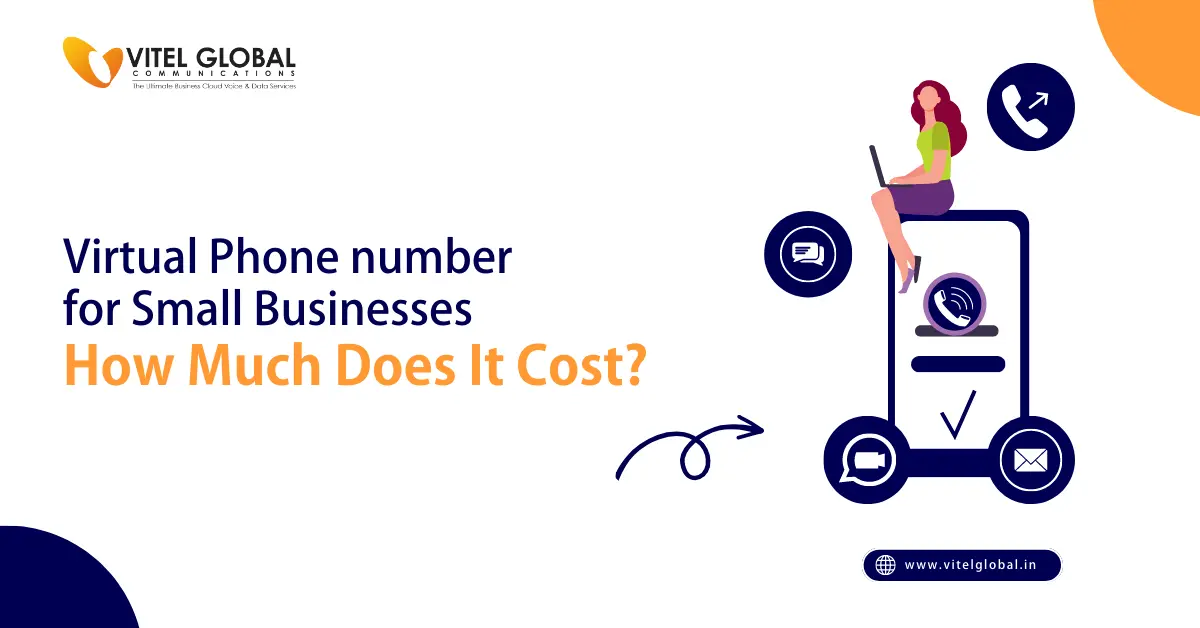Table of Contents
If you’re running a business, you’ve likely heard the word “virtual phone number.” These tools have taken over the commercial world in recent years, and for a good reason, they make life easier for everyone involved. If you still need to use it to manage your call center, this blog post will show you how easy and what benefits these systems offer.
The business phone system seamlessly integrates your company’s voice traffic with its data networks, enabling calls to be made from any location.
What is a virtual phone number for business?
It is a telephone number that will forward to any location, whether a landline, mobile or to another country. The service is used by internet access Some companies have also succeeded in using this communication format as many people prefer to keep their personal information private, thereby avoiding spam and telemarketing calls.
A virtual phone system is a third-party service that assigns an easily remembered phone number for free text and voice services. The company generally assigns these numbers to its employees, allowing them to make and receive calls or texts from their assigned numbers.
This service is especially useful for people in industries or positions requiring constant contact with customers, such as restaurants, car dealerships, plumbers, doctors, etc. They protect their privacy and ensure secrecy by not having their personal cell phone number or business line constantly available on a public platform like social media or Google search results.
The invention of mobile phones with programmable functions has allowed the creation of virtual phone numbers, similar to an additional line or extension in an office setting. In certain instances, the virtual phone system can be seamlessly integrated with the person’s existing phone number, enabling them to receive calls even if the caller ID is not linked to the company’s virtual number.
Today, people can choose from several third-party services that allow them to have multiple telephone numbers and email addresses through a single account. They can also see which companies they have permitted to use their number information in case they need it. Their call and text history is also saved to their account. All these benefits can be easier interface through the cloud-based phone system for small business.
How do virtual phone number works
The mobile app in their smartphones allows people to call one another. To dial a number, you need the user ID and the password of that person’s real phone number. You also need to know their country code and city code. You probably already knew this, but there are certain things you should know before using the application.
First, you should find out which service provides a virtual phone number. One of these services will allow you to obtain a virtual phone system on any mobile device worldwide.
You only need an email address or a computer with an internet connection to use these services. If you have this access, you can create a virtual phone number in minutes.
The first step is to download the application for the service you choose. Most applications are available on Android, iOS, and Windows devices. It means that you will be able to use them on any mobile device.
Once you have downloaded the application, create a user ID. The ID is made by typing in your email address or uploading a profile picture. Ensure you also include a strong password that no one can easily guess. Some services will automatically email you this information within minutes of signing up for an account. Make sure you save it somewhere safe to access your new service anytime.
You should link your new business number with the contact details of the people you want to be able to call you from their phones. Upload your contacts’ details, including names, email addresses, and phone numbers, and confirm them by clicking on designated links.
Send a message with your new phone number so that they can call you directly through their mobile device without going through any lengthy international dialling procedures.
Benefits of the virtual phone number
While it may sound counterintuitive, small business owners who convert their business lines to virtual numbers have somehow reduced their costs and increased productivity in myriad ways.
Here is a list of some benefits:
- When communicating with clients and customers, you no longer need to keep track or worry about a particular phone number. Like an email address, the business phone number can be accessed anywhere.
- Maintenance and keeping track of your communications are very easy and straightforward. When you have a virtual phone number, you can register it with only one carrier and manage all calls from any location.
- The maintenance of the number is also very easy for customers to use. To make it easier for customers to contact your company, instead of having them try to find a specific phone number, you could easily add “555” or some other extension before or after the primary number, allowing customers to call you more conveniently. Customers can recognize that they are interacting with an automated service or answering system when they call these numbers.
- Your company also saves a lot of money with a virtual phone number. You don’t need to pay for phone lines, nor do you need to worry about expensive equipment. Also, you don’t have to worry about the upkeep of your PBX phone system or whether you can afford the monthly maintenance fee.
- Technology is constantly evolving, and this enables small business owners to stay ahead of the game as far as communication capabilities are concerned. With the latest gadgets, you can improve your productivity using virtual phone systems since your employees can access them anywhere.
- It also allows for more flexibility since your company doesn’t have to worry about a premium line with many benefits built into it.
- Your staff can work from any location so that you can hire the best talent for the job.
- Based on the organization model and your industry, business phone systems give you options that might not be possible with physical lines. It may help protect your clients or customers from identity theft. For example, suppose you’re in an industry dealing with sensitive client information (such as legal or medical).

Factors affecting the cost of virtual phone services
We will examine the factors affecting these costs and how you can find the best deal with corporate business phone solutions for your needs.
A business phone number is a phone number that is not tied directly to a physical location. It is also called an “anonymous” or “disposable” phone number because it gets disconnected from the system when you use it once. In this way, these numbers offer privacy for conversations with people you may have met online or over text messages but don’t need enough to give them your real number.
A corporate phone number is useful in multiple ways. Before allowing access it can be used to mask your real phone number when some websites require you to share your real phone number. Virtual numbers solve this problem. They give you a “real-looking” number that doesn’t require any private information from you. You are sending online communications. It allows you to create a professional image by having an area code and a local number that matches the city and state of your current location.You are offering online or phone-based customer service.
Many organizations offer business numbers for customer service representatives as an alternative to giving customers their real phone numbers. It gives them more privacy, so they don’t have to worry about constant calls or texts about products or services they bought from them in the past.
Factors to Consider
The number of users: The more users you have, the more cost will be the same. The more lines you can connect to all your devices
Features: Price of the feature is not constant it depends on the type of the f. Additional features such as voicemail and call forwarding can add up to the same cost.
Setup fees: The cost of the setup fee depends on the provider. Your fees depend on what features and phones you want to set up. Additional features such as call forwarding can add up to your costs, and there are no contracts in place, so that you can switch providers anytime.
Subscription: Depending on your number of users, you can opt to pay for unlimited service or a monthly subscription (or even less). There is no contract in place to switch providers at any time.
Some companies offer virtual phone systems for small businesses, offering all the necessary services to make your company’s voicemail work and provide connectivity for your business’s phones.
Many software applications include an input gain control knob to minimize these factors.
Call minutes: As with any other phone service, you pay for the number of minutes you use. Usage fees vary widely across providers and are generally priced at a per-minute rate rather than a fixed monthly cost.
When a call comes in, the VoIP provider will send the phone number to your phone via data packets. VoIP providers offer various configurable options through their web-based user interfaces or automated ones by setting them up in an auto-attendant.
Caller ID is another difficult issue for VoIP technology to address. Not all caller ID information is available, and methods to circumvent this problem have succeeded. But may require specific router configurations for each VoIP provider.
International calling:
An international call on a virtual phone system typically allows users to make and receive calls. By using an internet connection rather than traditional phone lines.
The international calls vary based on the provider. Some providers may charge a flat rate for international calls, while others may charge per minute. It is important to check with the provider beforehand to understand the costs involved.
Additionally, some virtual phone services may have features that make international calling more convenient. As automatic country code detection or making calls using local numbers in different countries is more flexible. These features can make staying connected with friends, family, or business contacts worldwide easier and more affordable.
Types of virtual phone numbers
The following types will give you some information about what they mean and how they work.
Toll-free numbers: Toll-free numbers allow the caller to call without additional charge.
Virtual numbers: These are phone numbers usually available to a multinational company. It may be located in different areas and require a change of number when relocating.
Business numbers: Virtual business phone numbers are an excellent solution for companies. The organizations which want to expand their customer reach without the need for a physical location. Calls can be answers from anywhere and from any device.
Local numbers: These are virtual numbers for a specific region, usually in the same country as the customer.
Calling Plans: Based on the commercial purposes the phone numbers are designed. International operators offers pre-paid calls to anywhere in the world.
Voice over IP and Wireless: These are phone numbers dedicated to VoIP. It is wireless service providers and carriers, and international calls.
Vanity numbers: These are phone numbers that can be selected by the user are not available to others, including the provider. The number can sometimes be similar to the original but with a different prefix. It is more common with mobile phone services when users want a unique number than their cellular one.
Unallocated numbers: Reserved for future use or intended for special purposes. Automatic acquisition or identification of toll-free services, directory assistance, and non-geographic locations is not possible.
Shared numbers: These numbers allow members of the same organization to communicate with each other. It uses a single number rather than using separate telephone numbers.
Cost of virtual phone numbers for small businesses
Small and large organizations relatively quickly adopt virtual phone numbers. The low monthly cost and ease of use make them an attractive option for many companies.
Business IP phones are a primary way to communicate with customers whether you need a number for others to reach.
Most companies start with a landline number and then can get a mobile number. However, if you are running an organization, you likely want to use something other than your mobile number. Instead, you will get a Voice-over IP service or organization phone number to call directly.
Cost – The major benifit is it’s low of cost. With minimal additional fees only for call forwarding, actual physical calls placed to the phone number, and ease of use.
Conclusion
Virtual phone numbers technique is easy to use. There is no need to call your phone company or to have physical access to the phone number. In this day and age, where time is money, virtual phone numbers are a much more efficient option.





